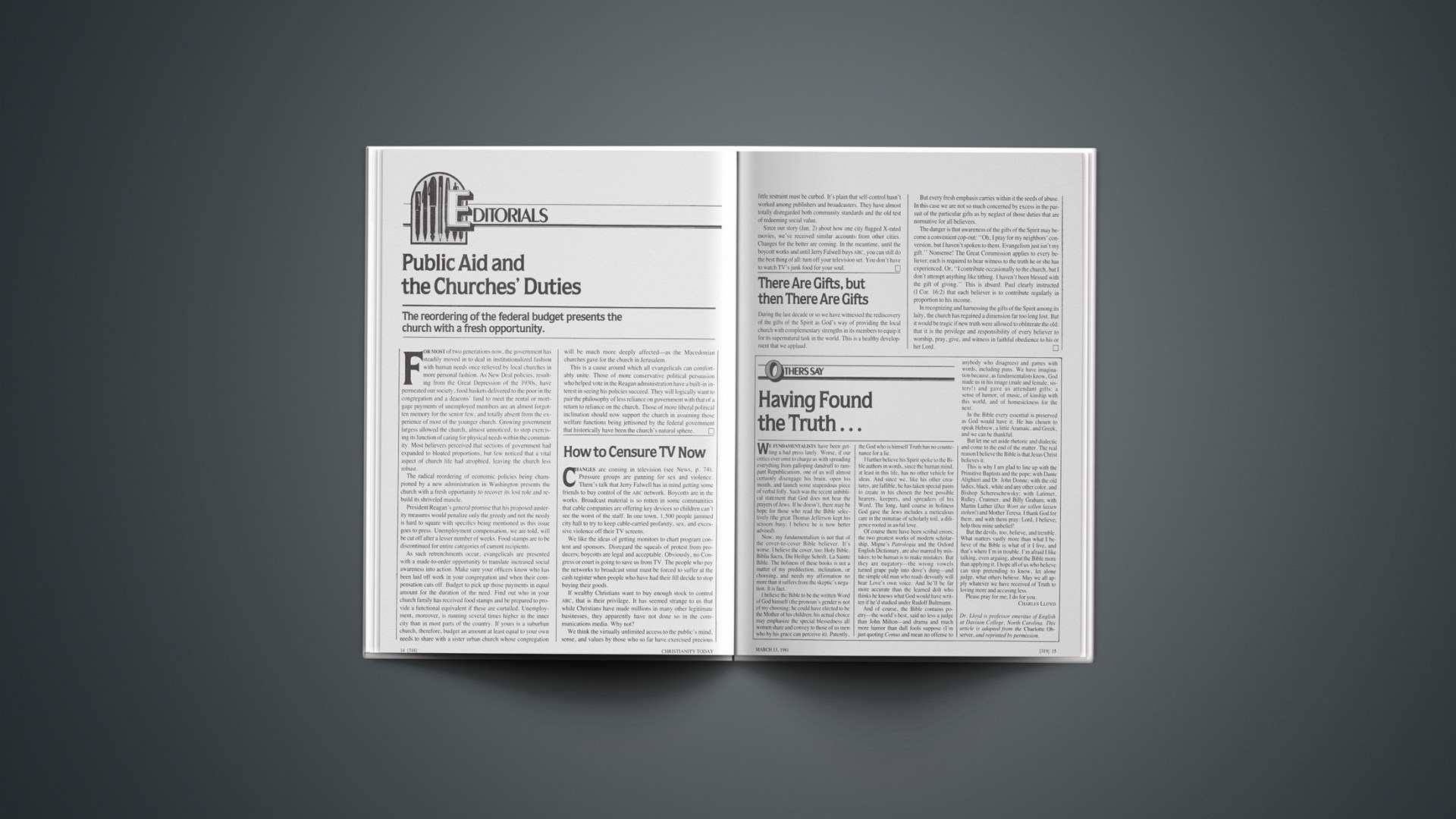We fundamentalists have been getting a bad press lately. Worse, if our critics ever omit to charge us with spreading everything from galloping dandruff to rampant Republicanism, one of us will almost certainly disengage his brain, open his mouth, and launch some stupendous piece of verbal folly. Such was the recent unbiblical statement that God does not hear the prayers of Jews. If he doesn’t, there may be hope for those who read the Bible selectively (the great Thomas Jefferson kept his scissors busy; I believe he is now better advised).
Now, my fundamentalism is not that of the cover-to-cover Bible believer. It’s worse. I believe the cover, too: Holy Bible, Biblia Sacra, Die Heilige Schrift, La Sainte Bible. The holiness of these books is not a matter of my predilection, inclination, or choosing, and needs my affirmation no more than it suffers from the skeptic’s negation. It is fact.
I believe the Bible to be the written Word of God himself (the pronoun’s gender is not of my choosing; he could have elected to be the Mother of his children; his actual choice may emphasize the special blessedness all women share and convey to those of us men who by his grace can perceive it). Patently, the God who is himself Truth has no countenance for a lie.
I further believe his Spirit spoke to the Bible authors in words, since the human mind, at least in this life, has no other vehicle for ideas. And since we, like his other creatures, are fallible, he has taken special pains to create in his chosen the best possible hearers, keepers, and spreaders of his Word. The long, hard course in holiness God gave the Jews includes a meticulous care in the minutiae of scholarly toil, a diligence rooted in awful love.
Of course there have been scribal errors; the two greatest works of modern scholarship, Migne’s Patrologia and the Oxford English Dictionary, are also marred by mistakes; to be human is to make mistakes. But they are nugatory—the wrong vowels turned grape pulp into dove’s dung—and the simple old man who reads devoutly will hear Love’s own voice. And he’ll be far more accurate than the learned dolt who thinks he knows what God would have written if he’d studied under Rudolf Bultmann.
And of course, the Bible contains poetry—the world’s best, said no less a judge than John Milton—and drama and much more humor than dull fools suppose (I’m just quoting Comus and mean no offense to anybody who disagrees) and games with words, including puns. We have imagination because, as fundamentalists know, God made us in his image (male and female, sisters!) and gave us attendant gifts: a sense of humor, of music, of kinship with this world, and of homesickness for the next.
In the Bible every essential is preserved as God would have it. He has chosen to speak Hebrew, a little Aramaic, and Greek, and we can be thankful.
But let me set aside rhetoric and dialectic and come to the end of the matter. The real reason I believe the Bible is that Jesus Christ believes it.
This is why I am glad to line up with the Primitive Baptists and the pope; with Dante Alighieri and Dr. John Donne; with the old ladies, black, white and any other color, and Bishop Schereschewsky; with Latimer, Ridley, Cranmer, and Billy Graham; with Martin Luther (Das Wort sie sollen lassen stehen!) and Mother Teresa. I thank God for them, and with them pray: Lord, I believe; help thou mine unbelief!
But the devils, too, believe, and tremble. What matters vastly more than what I believe of the Bible is what of it I live, and that’s where I’m in trouble. I’m afraid I like talking, even arguing, about the Bible more than applying it. I hope all of us who believe can stop pretending to know, let alone judge, what others believe. May we all apply whatever we have received of Truth to loving more and accusing less.
Please pray for me; I do for you.
CHARLES LLOYD1Dr. Lloyd is professor emeritus of English at Davison College, North Carolina. This article is adapted from the Charlotte Observer, and reprinted by permission.










